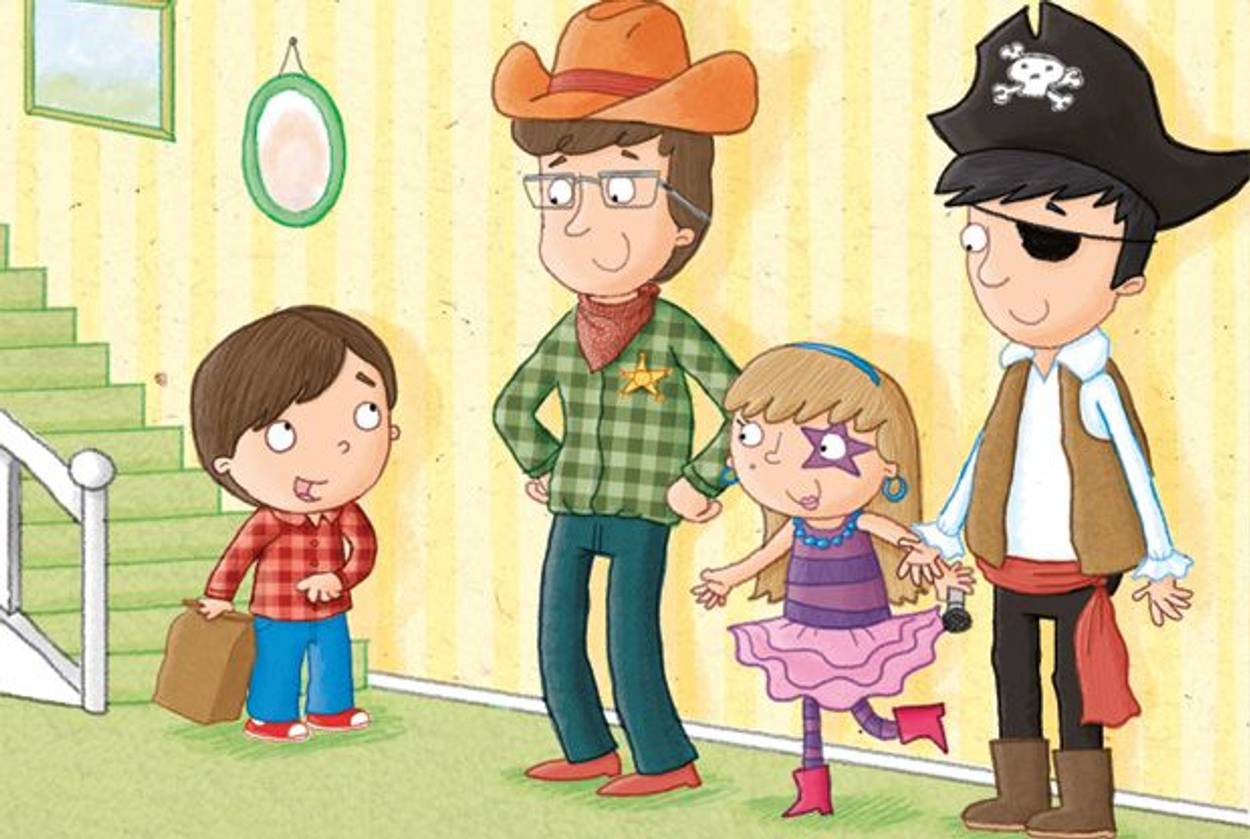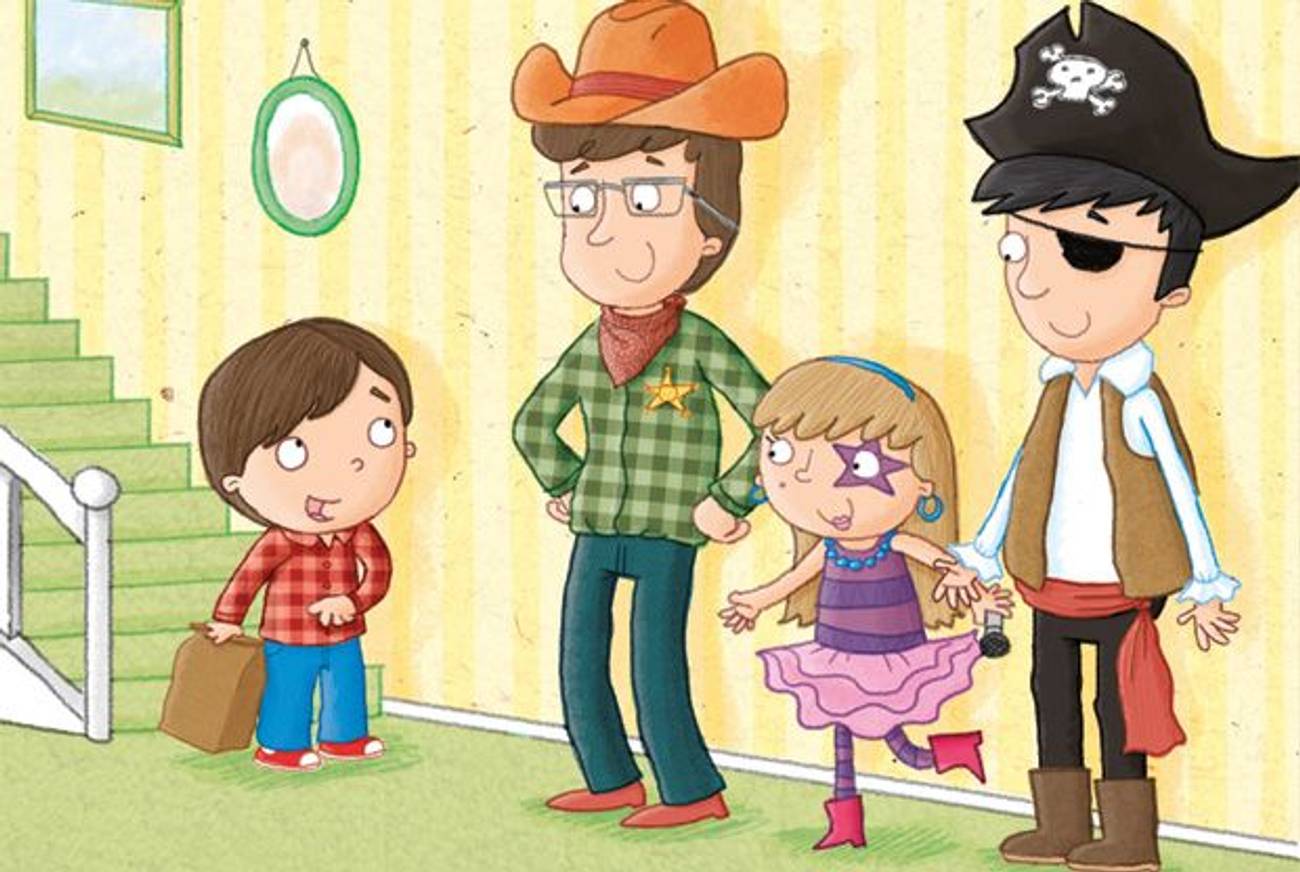Coming Out for Purim
The Purim Superhero, a new picture book for Jewish children, includes gay parents. It’s about time.




Nate has a dilemma: Purim is coming, and the other boys in his Hebrew school class are all going to dress as superheroes, but Nate wants to be an alien. What to do? With the help of his Daddy and Abba, Nate figures out a solution that delights everyone. And his story, The Purim Superhero, draws connections between his problem, the message of the holiday, and the process of coming out.
“Abba?” Nate asked. “Do you ever just want to be like everybody else?”
Abba looked at Nate. “You know the Purim story,” Abba said. “Queen Esther saved the Jews because she didn’t hide who she was. She told King Ahashuerus she was Jewish, and that her people were in danger.
“Sometimes showing who you really are makes you stronger, even if you’re different from other people.”
Predictably, certain Jews are having conniptions about a children’s book that includes gay parents and themes. “Disgraceful,” wrote a commenter on the Times of Israel’s feature about the book. Another wrote, “You may as well have a ‘Jewish’ book about how cheeseburgers and lobster are super kosher.” A third posited, “Judgement [sic] is coming.”
However, the naysayers were surrounded by commenters expressing excitement about the book. And in the land of professional reviews, Kirkus applauded The Purim Superhero as “both timely and entirely satisfying.” Publishers Weekly called its cartoonish art “cheery” and said that the text “can be wordy and overly earnest (an ironic effect, since Purim is basically the Jewish Mardi Gras) … but never overplays the relationship of Nate’s own family to the story.”

I loved the book. (And anyone who knows me or reads my reviews of children’s books knows I’m a tough room.) I think 4-year-olds and 7-year-olds, developmentally worlds apart, can appreciate The Purim Superhero on different levels. I like the way Nate’s friend Max answers every question with “yep”—kids love repetition. I expect kids will enjoy studying the pictures and identifying the different superhero costumes. (I laughed aloud at a wee Wolverine in the mesh window of a Purim carnival inflatable bouncy castle. Thank goodness he doesn’t have adamantium claws like the real Wolverine!) The fact that author Elisabeth Kushner is a former children’s librarian is evident in the read-aloud friendliness of the book. I appreciated the fact that the parents in the story are supportive and offer guidance but let Nate work through his dilemma himself rather than solving it for him. Helicopter parents of all sexual identities: Take note.
I shared the book with the monthly LGBTQ Parenting Group at Congregation Beit Simchat Torah, a progressive shul in New York City that caters primarily to queer folks. The group began about three years ago as the shul’s demographics were changing and the number of kids increasing. The synagogue now has Tot Shabbat services and a Hebrew school, too.
As Rabbi Rachel Weiss read the book aloud to the group, I watched the parents. Several became teary-eyed. “It’s so rare to see the reflection of our family in a children’s book, let alone a Jewish one,” one said afterward. Sure, I heard various nitpicks—there are no kids of color, only the boys wear kippot, the girls in the story wear pink and purple—but overall the response was rapturous. “I love that it’s just presented so casually, as a matter of fact, that the kid has two dads,” one mom said. “It’s not what the story’s about, it just is.” Another parent told a story about being horrified by her son’s earlier response to the story of Purim: He’d said, “Esther should hide who she is if it makes her safer.” She observed that a book like The Purim Superhero is a powerful counterpoint to that perspective.
During the session, Weiss added that a superhero metaphor happens to be her favorite way to teach children about Purim. “Most superheroes were created by Jews,” she pointed out. “They’re about being outsiders and about power and powerlessness, the disconnect between how a person may look nebbish-y on the outside but be a hero on the inside. Kids instinctively understand these issues. I use the holiday to get them to think about what powers they already have that they could use to be better people.” Purim turns conventional superhero narratives upside down. “It’s a holiday of reversals—revelry and fasting, getting so drunk you can’t tell the difference between Mordecai and Haman,” Weiss said. “And Esther’s situation is the reverse of the usual superhero story. Her superhero is who she is inside, not on the glamorous outside.”
Very few children’s picture books, let alone Jewish ones, feature LGBT parents. There’s Patricia Polacco’s oft-banned In Our Mothers’ House, Leslea Newman’s board books Mommy, Mama and Me and Daddy, Papa and Me, Vanita Oelschlager’s A Tale of Two Daddies and A Tale of Two Mommies, Todd Parr’s The Family Book, Justin Richardson and Peter Parnell’s And Tango Makes Three (another perpetually banned book), and a few more of varying literary quality. It’s hard for LGBT parents to not see themselves reflected in the books they read to their kids. For that matter, single parents (of all genders and orientations) rarely see themselves, either. The parents at CBST talked about their fondness for animal protagonists, whose gender isn’t an issue. I adore Susan Meyers’ Everywhere Babies, because there are a zillion permutations of family depicted, without editorializing; the focus is on the universal adorableness of babies.
The fact is, until The Purim Superhero, there were no LGBT-themed Jewish picture books. That emptiness in the market was what prompted Keshet, the organization that advocates for the full inclusion of LGBTQ Jews in the Jewish community, to sponsor a children’s-book-writing contest. Keshet partnered with the publisher Kar-Ben, which agreed to publish the winning manuscript if it met the company’s editorial standards. “We’d long been interested in publishing a book involving a same-sex Jewish family,” publisher Joanna Sussman told me. “With the Conservative and Reform movements now sanctioning same-sex marriage, and it becoming legal in more states as of the last election, it was clearly time. But we hadn’t found a really good, non-didactic story with a charming premise and engaging non-stereotypical characters.” Indeed, Kar-Ben felt that most of the Keshet contest entries fell short. “They were too earnest, too preachy, too aimed at strictly the same-sex community, which is not a broad enough market for us to be viable,” Sussman said. “But The Purim Superhero had appeal beyond same-sex families.”
Indeed, straight families seem to love the book. “I’ve been astonished at how moved many straight people are,” Keshet Executive Director Idit Klein told me. “There are a dozen or so book parties happening around the country, in Jewish bookstores and JCC’s and private homes; if we’d been asked we would have thought gay and lesbian couples would be doing all the hosting, but it’s pretty evenly split between straight couples with kids and gay couples. I think it really signifies a shift in the climate in the Jewish community. The book reflects the Jewish world they live in and want to raise their kids in, one they aspire to keep taking to a place of greater inclusion and equality.”
Still, PJ Library, the influential program that sends free books to Jewish children across the continent (it’s sent nearly 4 million books to nearly 176,000 families) declined to offer the book to its subscribers. When I asked PJ Library’s Book Selection Chair Chris Barash why the book wasn’t chosen, she replied in an email: “The criteria for a PJ Library book begins with a great story with Jewish content and appealing illustrations that children and families will want to read again and again. … Our Book Selection Committee looks at a number of factors so that the overall PJ line-up for each of our eight age groups is multi-dimensional, diverse and appealing to our target audience. … The fact that a book hasn’t been chosen for our line-up may just be a question of a good fit at a given time and doesn’t mean that it won’t appear on our list in the future.”
I pointed out that The Purim Superhero meets all of PJ Library’s criteria. (Especially “diverse”!) So, why was it turned down? “Many quality books meet the basic checklist of criteria but aren’t selected,” she responded in another email. “It’s our policy not to share the specific reasons that any considered book isn’t selected.” (If you’d like The Purim Superhero to be included in the future, you can let PJ Library know by writing to them here.)
Sussman remains optimistic that the book will find its audience. “This isn’t just a ‘do the right thing’ project for us,” she said. “We really think it’s marketable. And if it does well, we’ll publish more.”
Marjorie Ingall is a former columnist for Tablet, the author of Mamaleh Knows Best, and a frequent contributor to the New York Times Book Review.